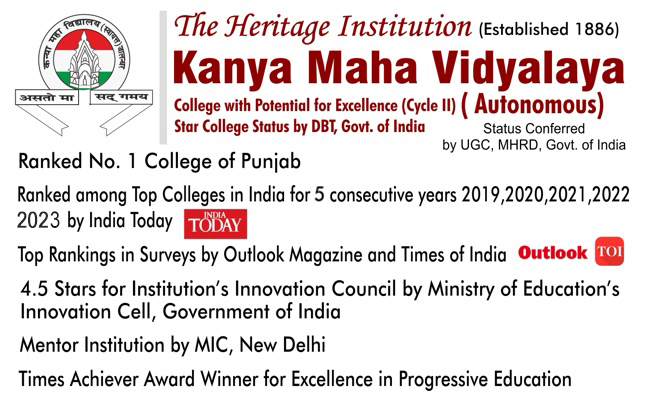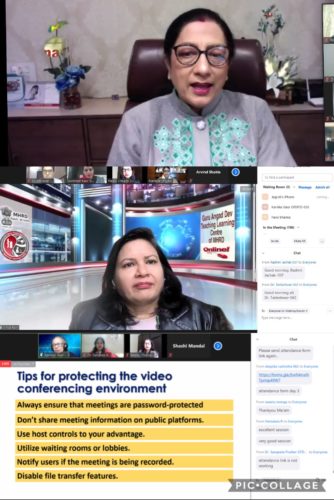Reception Desk : 0181-2296605, 2296606
For Admission related queries : 7009969253,9814406986
Email Id : kmvoffice1886@gmail.com,
kmvjalandhar@yahoo.com
- Only College under GNDU to be bestowed with FIST & CURIE grant by DST- Govt. of India
- Star College by DBT- Govt. of India
- Designated College with Potential for Excellence
- Accredited ‘A’ by UGC-NAAC
- Recognised as a Center of Excellence by RASCI, Government of India
- Best College in Punjab as per the Surveys
- Kaushal Kendra by UGC, MHRD, Govt. of India and first College under GNDU to have been granted Kaushal Kendra
January 20, 2021
Kanya Maha Vidyalaya- the Heritage & Autonomous institution, Seat of Women Empowerment with Top National and State Rankings by India Today Survey of Best Colleges 2020 (various categories) & Outlook Magazine organised 3rdday of one week online national Faculty Development Program in collaboration with Guru Angad Dev- Teaching Learning Centre, SGTB Khalsa College, University of Delhi on Development of e-content & MOOCS in Four Quadrants sponsored by Department of Biotechnology, Government of India. The first technical session of Day 3 was delivered by Dr. Vimal Rarh, Project Head & Joint Director, Guru Angad Dev- Teaching Learning Centre, SGTB Khalsa College. The topic of her talk was E-Kits. Dr Rarhstarted her lecture mentioning the importance of ICT enabled education nowadays. She mentioned its components as curriculum and content development methodology, Teaching learning and assessments. She suggested teachers should be technology savvy. For developing the e-content, teachers should have detailed knowledge of MS office specifically MS-word, Powerpoint and Excel as it will be the base for generating static content. She stressed upon generation of MOOCs and asked teachers to write creative and elective proposals. One should create the content in the field he/she is comfortable and having expertise. e-Content should be authentic, self learning, structured, modular and reusable. Ease of navigation should be there for e-content. Modular content will help the student in mix-matching with modules of other universities. She showed a number of videos and animations generated by different subject experts under ARPIT programme to encourage the participants. She talked about importance of concept clarity, typographical errors, language editing and scientific editing in generating good e-content. She emphasised both on considerable quality and quantity of the content. To make the content interactive videos and audios should be incorporated & most important thing to be followed is to avoid plagiarism. She talked about four quadrants of MOOCs on SWAYAM including e-Tutorial, e-Content, Discussion Forum and Assessment. She explained the structure and strategies of MOOCs in detail. The second technical session of day 3 was delivered by Prof. R C Sharma, Ambedkar University, Delhi. The topic of his talk was How to use web conferencing tools effectively. Dr. Ramesh started his lecture by stating the importance of various video conferencing tools e.g. GoTo meetings, Zoom, Cisco WebEx, Lync, Google meet, Jio meet& Skype etc. He compared these web tools on the basis of their working. He suggested teachers should know more about the components of these tools and while working with them they should be more focused on content, pedagogy and technology. He encouraged the participants to use best security practices while video conferencing. He also gave tips for protecting the video conferencing like meetings should be password protected, host should join first and leave last, prevent the recordings of meeting, not to share meeting information publicly and many more. One should create its own channel on youtube &share their videos on that instead of WhatsApp.He also explained more about other web tools like Google duo, Google hangouts and Google Suite. He suggested to use Gobrunch.com web tool for online class teaching as it is free with unlimited time. Dr. Ramesh also gave hands on training how to go live on youtube through different video conferencing tools like jitsimeet. Principal Prof Dr Atima Sharma Dwivedi averred that this kind of programs will enhance the teaching ability of the faculty members. She further maintained that it is important for every teacher to upgrade the teaching skills for the better understanding of the students. Madam Principal lauded the efforts of organising committee for successfully organising the program.









